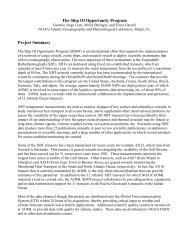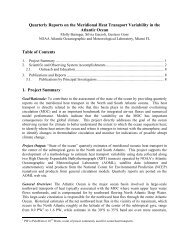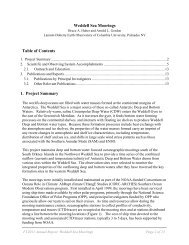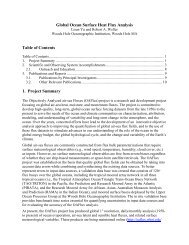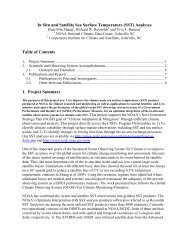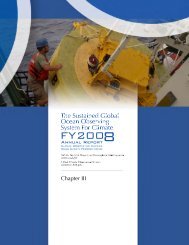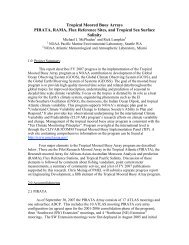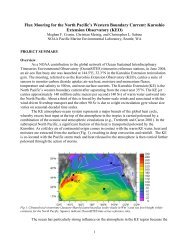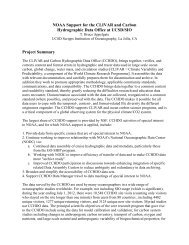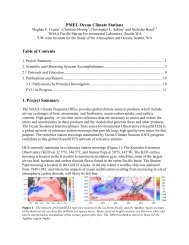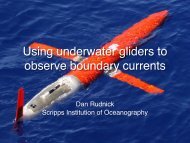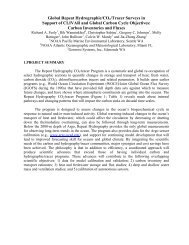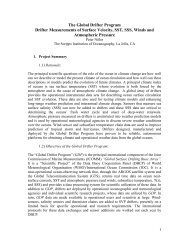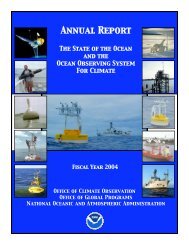GCOS Implementation Plan - WMO
GCOS Implementation Plan - WMO
GCOS Implementation Plan - WMO
You also want an ePaper? Increase the reach of your titles
YUMPU automatically turns print PDFs into web optimized ePapers that Google loves.
<strong>Implementation</strong> <strong>Plan</strong> for the Global Observing System for Climate in Support of the UNFCCC<br />
(2010 Update)<br />
Action C8 [IP-04 C10]<br />
Action: Ensure continuity and over-lap of key satellite sensors; recording and archiving of all<br />
satellite metadata; maintaining appropriate data formats for all archived data; providing data<br />
service systems that ensure accessibility; undertaking reprocessing of all data relevant to climate<br />
for inclusion in integrated climate analyses and reanalyses, undertaking sustained generation of<br />
satellite-based ECV products.<br />
Who: Space agencies and satellite data reprocessing centres.<br />
Time-Frame: Continuing, of high priority.<br />
Performance Indicator: Continuity and consistency of data records.<br />
Annual Cost Implications: Covered in the domains.<br />
3.5. Integrated Climate Products<br />
3.5.1. Generation and Use of Products<br />
While observations of the climate variables are an essential pre-requisite, the users in need of climate<br />
information generally require analysed outputs and products. Thus developing analysed products for<br />
all ECVs is vital; these products should always include information on the uncertainty inherent in the<br />
analysis. Experience has shown that detecting trends in products can be problematic and that the<br />
independent generation of a number of high-quality single-source datasets as well as integrated<br />
products is needed to ensure reliable conclusions. While the Parties are supporting a number of<br />
analysis centres for certain variables, additional operational analyses are required. International<br />
coordination of these activities is highly desirable to take advantage of scientific and technological<br />
advances, avoid duplication, and promote efficiency, complementarity and cooperation rather than<br />
competition. There are also too few analysis centres that are integrating observations of variables<br />
related to one another using data from different instruments or using other data or products to warn of<br />
potential issues. For example, the detection of sea ice from microwave emissivity might benefit from<br />
analyses of atmospheric surface temperature to indicate the occurrence of wet ice.<br />
At the same time, it is important to recognise that alternative analysis approaches are required to<br />
verify the accuracy and stability of the various outputs for specific variables. It is therefore essential for<br />
analysis centres to ensure thorough intercomparison of their products and some use of common<br />
methodologies and verification approaches so as to allow insight into errors and help product users to<br />
be aware of product differences.<br />
Recognizing these issues, the <strong>GCOS</strong> Steering Committee has recently developed guidelines for the<br />
generation of datasets and products meeting the <strong>GCOS</strong> requirements. 56 These guidelines are<br />
intended to help producers of climate-relevant datasets and products to provide users with all the<br />
information they need to assess the suitability and maturity of the datasets and products for their<br />
particular applications.<br />
Agencies and institutions supporting observing systems for climate should encourage as well as<br />
support the adoption of these guidelines, and thereby maximize the value of the datasets and<br />
products so generated for the user community. This would include support to international scientific<br />
expert groups undertaking critical comparisons of available datasets and products in a particular field<br />
or providing guidance on the generation of new products. Further, international programmes and<br />
bodies should widely publicize the guidelines, and encourage their adoption.<br />
Action C9<br />
Action: Achieve adoption of the <strong>GCOS</strong> dataset and product guidelines; critical comparison of<br />
datasets/products and advice on product generation for all ECVs by the climate community.<br />
Who: Parties’ national agencies, working with key international coordination bodies, such as<br />
CEOS, GEO, IGBP, and IPCC Task Group on Data and Scenario Support for Impact and Climate<br />
Analysis (TGICA), and coordinated through <strong>GCOS</strong> and WCRP.<br />
Time-Frame: Wide adoption by 2011 and ongoing.<br />
Performance Indicator: Level of adoption of guidelines; number of datasets stating adoption of<br />
guidelines; number of ECVs for which routine intercomparison arrangements are in place.<br />
Annual Cost Implications: 1-10M US$ (20% in non-Annex-I Parties).<br />
56 <strong>GCOS</strong> (2010): Guideline for the Generation of Datasets and Products Meeting <strong>GCOS</strong> Requirements, <strong>GCOS</strong>-143, <strong>WMO</strong>/TD-<br />
No. 1530, http://www.wmo.int/pages/prog/gcos/Publications/gcos-143.pdf<br />
35



